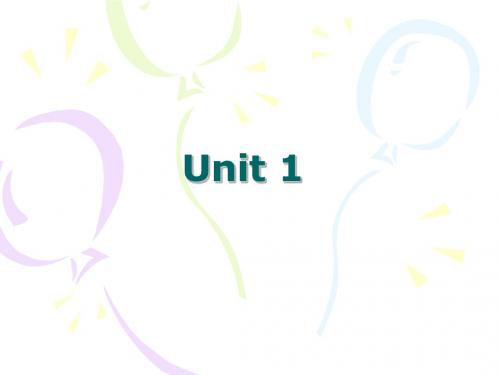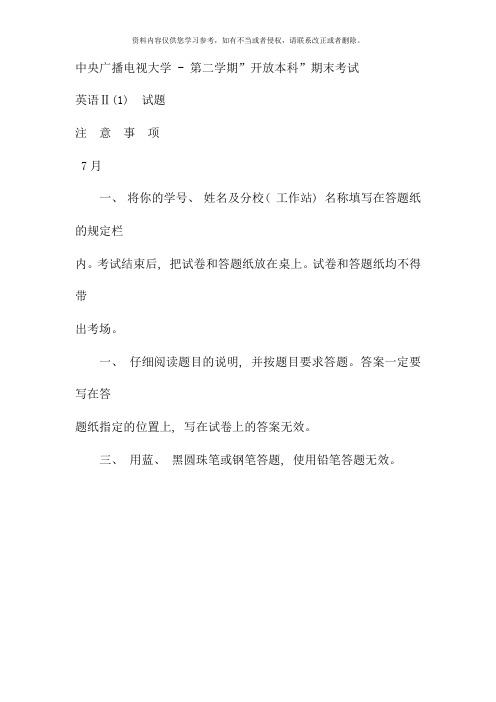电大土木本英语II(1)PPTThisisEnglish3(U17)
电大英语Ⅱ(1)Unit 1-3

• 例: When you do not understand a word, you can look it up in this dictionary. I don’t get along with my elder sister. • 3. always 和 forever 与进行时连用 概念: 1) 表示说话人对所议论的人物的不满或批评 2) 表示说话人对所议论的人物的赞扬 • 例: • She is always borrowing money from me. He was forever coming up with good ideas.
• 例: Was the song composed by a soldier? Such books were written for children. We were shown the machines they had just produced. • 2. 短语动词 概念: 概念:由两个或三个词组成的固定结构, 具有其 固定的意思,有及物和不及物之分形式: 1)由两词组成的短语动词可分开(动词+副 词),也可以不分开(动词+介词)。 2)由三词组成的短语动词不可分开(动词+名 词/副词+介词)
• 4、used to + do 的否定句和疑问句 、 • 形式: 否定句: 主语+didn’t use to + 动词原形. 一般疑问句: Did+主语+use to + 动词原形? 特殊疑问句: 疑问词+did +主语+use to + 动词原形? • 例: He used to visit his mother oncห้องสมุดไป่ตู้ a week. • 比较:be/get used to (doing) sth. • 例:We’re used to the weather here. • John got used to working late.
土木工程专业英语1ppt课件

【例6】The huge investment in the highway infrastructure will be erased quickly if proper maintenance and rehabilitation procedures are enforced and funded.
由于总重量减轻,就有可能建造更高的楼房。
语法特点 • 4、较多地使用祈使语气和公式化表 达方式
在理论分析和公示推导中常采用Assume that…, Suppose that…,Let…等祈使语气的 表达方式。
【例5】Suppose that P=0 at x=y.
假定当x=y时,P=0。
语法特点 • 5、条件语句较多
参考书目
参考书目
参考书目
段兵廷《土木工程专业英语》课文内容
• • • • • • • • • • • Lesson 1 Civil Engineering(土木工程学) Lesson 2 Building and Architecture(建筑物与建筑学) Lesson 3 Components of a Building(建筑物的组成) Lesson 4 Tall Buildings(高层建筑) Lesson 5 Environmental Engineering(环境工程) Lesson 6 Heating, Ventilating, and Air Conditioning (取暖、通风和空调) Lesson 7 Bridge(桥梁) Lesson 8 Bridge Design and Construction(桥的设计与构造) Lesson 9 Harbors and Sea Works (海港与海上工程) Lesson 10 Dam(大坝) Lesson 11 Highway Engineering(高速公路工程)
土木工程专业英语PPT课件

also determine the combination of appropriate materials: steel,
土木专业英语英文课程PPT课件

14. grain[grein] n.谷物, 谷类, 谷粒, 细粒, 颗粒,纹理,粒面 15. silicon [`silikәn] n.[化] 硅,硅元素 16. Manganese [`mæŋgəni:z]n.<化>锰 (元素符号为Mn) Magnesium[mæ `ni:zjәm]n.镁(元素符号为Mg) Calcium[`kæ lsiәm]n.钙 17. seashell [`si:ʃel]n.海贝壳海贝,贝壳 18. negligible[`neglidӡәbl] adj.可以忽略的, 不予重视的,微不足道的 19. synthetic [sin`Ѳetic] adj.合成的, 人造的, 综合的 20. resin [`rezin] n.树脂,胶质,人造树脂 vt. 涂树脂于 21.thermosetting [ֽΘә:mәu`setiŋ]adj.热硬化性的,热凝性的,热固性的
lju:] n.场所`]In lieu of =instead of
lieu
透露 ,告知 ,传授 ,)指抽象事物(in)+part vt.给予.=im(v.前缀,←(im`pɑ:t]] )Im2part
Lesson 18 Building Materials P158
NEW WORDS AND PHRASES 1.elasticity [ilæ s'tisiti] n. 弹性,弹力,弹性力学 2.stiffness ['stifnis] n.坚硬, 硬度 劲度,刚度 3.secular ['sekjulә] adj.长期的, 世俗的,现世的,非宗教的 4.temple ['templ] n. 坦普尔(姓氏) 庙,寺,神殿,教堂 5.pyramid [`pirәmid]n.金字塔,叠罗汉金字塔,四面体(角锥、棱椎),
电大本科汉语言文学英语II试题及答案重点

中央广播电视大学 - 第二学期”开放本科”期末考试英语Ⅱ(1) 试题注意事项7月一、将你的学号、姓名及分校( 工作站) 名称填写在答题纸的规定栏内。
考试结束后, 把试卷和答题纸放在桌上。
试卷和答题纸均不得带出考场。
一、仔细阅读题目的说明, 并按题目要求答题。
答案一定要写在答题纸指定的位置上, 写在试卷上的答案无效。
三、用蓝、黑圆珠笔或钢笔答题, 使用铅笔答题无效。
第一部分交际用语( 共计10分, 每小题2分) 、 71-5小题: 阅读下面的小对话, 从A\B\C三个选项中选出一个能填入空白处的最佳选项, 并在答题纸上写出所选的字母符号。
1.- What subjects are you studying?-------------A. Yes, I'm studying historyB. I'm studying philosophyC.I'm doing my homework2.- May I help you, madam?_________________.A.Sorry,I have no ideaB. You'd better give me a handC. Yes, I'd like 2 kilos of orange3.- Well, Mary, how are you? ‘---------------一.A.I'm goodB.I'm niceC.I'm fine4.- Hello, could I speak to Don please?——?A.Who's speakingB.Are you JaneC.Who are you5.- Excuse me, would you lend me your calculator?____________.B.Yes,I have a handA. Certainly. Here you areC.It~s nothing第二部分词汇与结构( 20分, 每小题2分)6-15小题: 阅读下面的句子, 从A.B.C三个选项中选出一个能填入空白处的最佳选项, 并答题纸上写出所选的字母符号。
电大本科汉语言文学《英语II》试题及答案

10中央广播电视大学 2018-2018 学年度第二学期“开放本科”期末考试 英语 II (1)注意事项一、将你的学号、姓名及分校(工作站)名称填写在答题纸的规定栏内。
考试结束 后,把试卷和答题纸放在桌上。
试卷和答题纸均不得带出考场。
监考人收完考卷和答题纸 后才可离开考场。
一、仔细读懂题目的说明,并按题目要求和答题示例答题。
答案一定要写在答题纸的 指定位置上,写在试卷上的答案无效。
三、用蓝、黑圆珠笔或钢笔答题,使用铅笔答题无效。
第一部分交际用语(共计 分,每小题 2 分)1-5 小题:阅读下面的小对话,从 A.B.C 三个选项中选出一个能填入空白处的最佳选 项.并 在答题纸上写出所选的字母符号。
1. -Hello, may I talk to the headmaster now?A. sorry, he is busy at the moment B . No, you can'tC . Sorry, you can't2. -What about going for a walk?A . Why not?A good ideaB . That's all rightC . Walking is good to you3. -What's the problem, Harry?A . No problemB. 1 can't remember where I left my glasses C . No trouble at all4. -What kind of TV program do you like best?A . I'm too busy to sayB.I only watch them at weekendC. It's hard to say, actually5. -Can you turn down the radio, please?A . Oh,l knowB. I'm sorry,I didn't realize it was that loudC . Please forgive me 第二部分词汇与结构( 20 分,每小题 2 分)6-15 小题:阅读下面的句子,从 A\B\C 三个选项中选出一个能填入空白处的最佳选项,并 在答题纸上写出所选的字母符号。
电大土木本英语IIThisisEnglish微课获奖课件
Special structure
• Nobody (No one) likes living here, don't they?
don`t they? 3. The crime rate is going up, isn`t it? • The teachers are having a meeting now,
aren`t they? 4. You have finished your work, haven`t you? • Jim has eaten much beef, hasn`t he?
• Somebody (Someone) asked her for help, didn't they?
• Let's go to school, shall we? • Hand in your exercise-books, will you? • I'm going to answer the question, aren't I ?
• Crime can lead to the family break-up. • Her carelessness could resulted in a
mistake
5. the question tags
1. He studies English, doesn`t he? • Betty likes drinking coffee, doesn`t she? 2. They need our help, don`t they? • The police often talk to the witnesses,
电大土木本英语ii1pptthisisenglish3u
…The old bike is being repaired (by me) for my brother.
• We are taking Ann to the party. … Ann is being taken to the party this
• take medicine
take on / off
• take phones / picture take away
• take notes
take up
• take over
take after sb.
2. It takes time to do sth.
= sb. spend time in doing sth.
1. Conduct: control; manage; guide; behave • He conducts the business affairs well. • They are conducting the visitors around
the museum. • These young men conduct themselves
afternoon.
• They are building a modern library.
… A modern library is being built (by them).
• The Commission is conducting this
investigation.
…This investigation is being conducted by the Commission.
电大英语II(1)
“开放英语3多媒体学习系统”试用实施方案中央电大外语部根据教育部大学公共英语教学改革的要求,结合“中央广播电视大学人才培养模式改革和开放教育试点”英语教学改革的需要,中央电大启动了电大开放英语教学改革项目。
这个项目以多媒体学习系统的推广应用为新切入点,旨在帮助电大成人学生进行个性化自主学习,强化学习过程,提高学习质量,培养学生的英语综合应用能力,同时推动电大人才培养模式改革及英语教学改革。
一、多媒体学习系统说明开放英语3多媒体学习系统供电大开放本科非英语专业的学生使用, 一学期完成,共3学分。
学习系统以学生基于计算机的自主学习为主,面授辅导课为辅,并具有学习过程跟踪、学习行为记录及统计数据的传输功能。
学生通过CD-ROM在本地计算机上学习,学习过程的数据、测试结果和作业等信息通过网络传输到中央电大形成性测评系统中,各级电大的教师通过形成性测评系统对学生的学习过程、作业和学习进度进行审阅和监控。
学习系统主要包括两部分,光盘学习系统和形成性测评系统。
学习系统光盘与课程教材文字结合,配合教材使用,是对教材内容的整合与补充; 同时发挥计算机的优势,整合优化了多种学习资源,有利于学生自主选择学习资源。
光盘中包含了“英语II (1)”的电视课内容以及部分教材中的听力内容,同时增添了课文翻译和大量新设计的阅读练习。
光盘配合全国大学英语(B)的网考思路和教材内容,通过技能强化训练,为学生在有效学好教材内容的同时准备全国统考提供有效帮助。
光盘内容丰富,加强练习环节并提供有针对性的及时反馈,利于学生自学使用,同时记录和保存形成性测评系统具有以下功能:学生学习过程的监控、记录及成绩管理、统计等数据管理;教师远程评判主观性作业和扩展资源的上传下载等传输管理,以及有关教师和学生的信息数据查询等。
关于学习系统的具体介绍和操作说明请登录中央电大考试平台(网址:http:// ),下载“形成性考核”栏目中的“形成性测评系统用户使用手册”和“课程专栏”栏目中“开放英语3多媒体学习系统演示课件”。
土木工程本科生专业英语课程1-2
土木工程关乎社会服务、发展与进步
Unit 1 Introduction of Civil Engineering
Unit 1 Introduction of Civil Engineering
Unit 1 Introduction of Civil Engineering
Unit 1 Introduction of Civil Engineering
Unit 1 Introduction of Civil Engineering
土木工程关乎社会服务、发展与进步
Unit 1 Introduction of Civil Engineering
Unit 1 Introduction of Civil Engineering
Unit 1 Introduction of Civil Engineering
Unit 1 Introduction of Civil Engineering
Unit 1 Introduction of Civil Engineering
Unit 1 Introduction of Civil Engineering
Unit 1 Introduction of Civil Engineering
考试方式:
出勤+讲座+作业(30%--40%)
闭卷考试(60%--70%)
土木工程专业英语
Reference
土木工程专业英语,苏小卒,同济大学出版社 国家精品课程网,/
MIT Open Course,/index.htm
Unit 1 Introduction of Civil Engineering
Unit 1 Introduction of Civil Engineering
- 1、下载文档前请自行甄别文档内容的完整性,平台不提供额外的编辑、内容补充、找答案等附加服务。
- 2、"仅部分预览"的文档,不可在线预览部分如存在完整性等问题,可反馈申请退款(可完整预览的文档不适用该条件!)。
- 3、如文档侵犯您的权益,请联系客服反馈,我们会尽快为您处理(人工客服工作时间:9:00-18:30)。
the use of modal verbs
will →would; can → could; must→ had to; should
• “I will help you with math”. → Joe said that he would help me with math. • “I can repair the computer” → She said that she could repair the
• 7. “How many cars can you produce each year?”
→ He asked me how many cars we could produce each year.
Imperative sentence 祈使句
1.“Be quiet please, everyone.” → The teacher asked us / the
computer. • “We must arrive there on time” → They told us that they had to arrive there
on time. • “You should practice speaking English”. → He told me that he should practice
my wallet the day before. 3.“when and where did you see them?” → She wanted to know when and
where I had seen them. 4. “What can you do for us?” → He asked us what we could do for
• 5. Some of the children are refugees.
• 6. Several of the children are of mixed ethnic background.
• 7. Most of the children are black and Asian.
• 8. Nearly all of the children were born in the UK.
This Is English 3
开放英语 3 (U17)
Book 1
Unit 17 Live and Let Live
Section 1
Activitieivities 10—19
Study Tip Review Reminder
Purposes:
• Study language to describe cultural diversity and customs;
host.
• It is usual to take turn to buy a
drink for everyone in your group.
them.
• 5. “Why didn’t you come to the party?”
→ He wanted to know why we hadn’t come to the party.
• 6. “What are you doing now, children?”
→ They wondered what the children were doing then.
speaking English.
It is + adj. + that-clause
• It is very important to learn
English well.
• It is useful to practice speaking
English every day.
• It is usual to take a present to the
• 2. Very few of the children are from Eastern Europe.
• 3. Only of few have Arabic as a first language.
• 4. A few of the children have English parents.
• Study the use of the quantifiers; • Study the reported questions; • Revise the reported speech using
modal verbs.
the use of the quantifiers
• 1. None of children have French as a first language.
students to be quite. 2. “Hurry up , David.” → David` mother told him to hurry
up. 3. “Don`t be late for class, Betty.” → The monitor ordered Betty not to
• 9. All of the children are in Class 3B.
the reported questions 疑问句
1.“Are you late?” → He asked me whether / if I was late. 2. “Did you lose your wallet yesterday?” → She asked me whether / if I had lost
